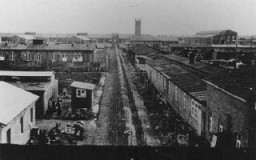You searched for: 互联网企业排名谷歌【TG飞机:@bapingseo】巴哈马引流软件【TG电报:@bapingseo】網絡推廣中整體推廣【Telegram:@bapingseo】彩九app下载分分彩app大平台金富快3?8cBv5Q/0aEDr4.html
<< Previous | Displaying results 401-425 of 475 for "互联网企业排名谷歌【TG飞机:@bapingseo】巴哈马引流软件【TG电报:@bapingseo】網絡推廣中整體推廣【Telegram:@bapingseo】彩九app下载分分彩app大平台金富快3?8cBv5Q/0aEDr4.html" | Next >>
-
Morris Kornberg
ID CardMorris was the youngest of six children born to a religious Jewish family in Przedborz, a south central Polish town with a large Jewish population. Morris' family owned a business that supplied nearby factories with raw metal materials. 1933-39: When Germany invaded Poland in early September 1939 Morris and his family fled to the woods. They returned a few days later; most of the town had been burned down. The Nazis set up a ghetto and ordered everyone age 13 to 50 to report for work details. His family…
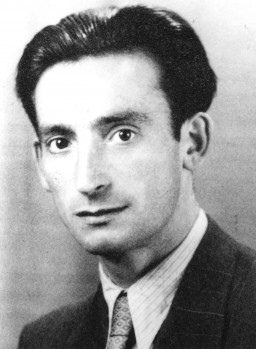
-
Arlette Waldmann
ID CardArlette's Russian-Jewish mother and Romanian-Jewish father had studied medicine together in Paris. After finishing medical school, they married and decided to set up practice in Broncourt, a farming village of 300 inhabitants in northern France. 1933-39: Arlette's father was an old-fashioned doctor who made housecalls, by bicycle at first, then on a motorcycle, and finally, in a car. His patients looked forward to seeing him and held him in high esteem, always offering him coffee and schnapps. Even after…
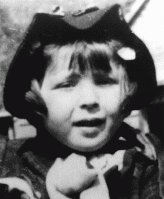
-
Adela Low
ID CardAdela, known as Udl to her family, was one of four children born to a Jewish family in the Polish town of Ulanow. Her father was a landowner and cattle merchant, transporting calves from the Ulanow area for sale in other towns in the region. From the age of 3, Adela attended a private religious school for girls where she learned Jewish history and Hebrew. At age 7 she began public school. 1933-39: Adela came from a charitable family; when her mother baked challah, a special bread for the Jewish Sabbath,…
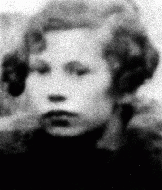
-
Herschel Low
ID CardHerschel was the oldest of four children born to a Jewish family in the Polish town of Ulanow. His father was a landowner and cattle merchant who transported calves from the Ulanow area for sale in other towns. Herschel attended a religious school from the age of 3, and started public school at age 7. 1933-39: Since Herschel was skilled with his hands, his father got him a job weaving reed baskets after he graduated from high school. Herschel was also a member of a Jewish youth organization, Benei Akiva,…
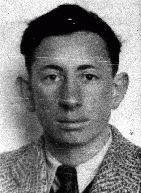
-
Pawel Wos
ID CardPawel, a Roman Catholic, fled to Danzig, Germany, in 1914 to avoid conscription in the Russian army. Since Germany and Russia were at war, Pawel was arrested by the Germans as an enemy alien and sent to work on a farm in northern Germany. He met Anna Szachowska there, and they married in 1918. The couple moved to Warsaw where they raised 4 children. In 1930 Pawel opened a textile business. 1933-39: Despite the Depression, Pawel's business prospered and they expanded their operations. In 1938 some friends…
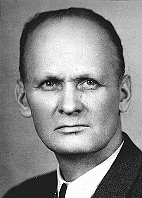
-
Refugees Today
ArticleAs of mid-2022, there were about 27 million refugees. Learn more about these refugees, the violence they face, and the global impact of the refugee crisis.
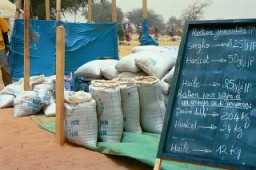
-
A notice sent by the American Consulate General in Berlin regarding immigration visas
DocumentA notice sent by the American Consulate General in Berlin to Arthur Lewy and family, instructing them to report to the consulate on July 26, 1939, with all the required documents, in order to receive their American visas. German Jews attempting to immigrate to the United States in the late 1930s faced overwhelming bureaucratic hurdles. It was difficult to get the necessary papers to leave Germany, and US immigration visas were difficult to obtain. The process could take years.
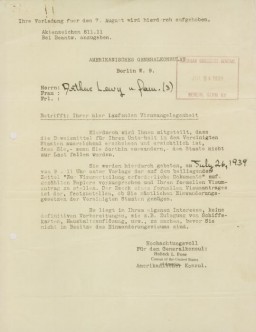
-
Hajj Amin al-Husayni meets Hitler
FilmIn this German propaganda newsreel, the former Mufti of Jerusalem, Hajj Amin al-Husayni, an Arab nationalist and prominent Muslim religious leader, meets Hitler for the first time. During the meeting, held in in the Reich chancellery, Hitler declined to grant al-Husayni’s request for a public statement--or a secret but formal treaty--in which Germany would: 1) pledge not to occupy Arab land, 2) recognize Arab striving for independence, and 3) support the “removal” of the proposed Jewish homeland in…
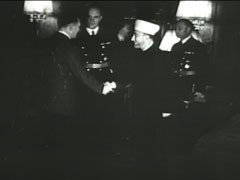
-
Herbert Oppenheimer describes activities of the Hitler Youth
Oral HistoryHerbert Oppenheimer was born on January 4, 1926, in Berlin, Germany. He lived with foster parents, who were Seventh-Day Adventists. While living with his foster parents, he had to join Hitler Youth along with everyone else in his class at school. During this time, he learned that he was Jewish. The school consequently expelled him from the Hitler Youth. All prospective members of the Hitler Youth had to be "Aryans." He had to leave his foster parents in April 1939, and lived in an orphanage run by the…
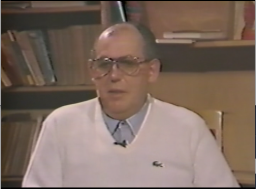
-
Sally Pitluk describes her removal from forced labor at Budy
Oral HistorySally Pitluk was born to Jewish parents in Płońsk, Poland in 1922. A few days after the German invasion of Poland in 1939, Płońsk was occupied. Sally and her family lived in a ghetto from 1940-1942. In October of 1942, Sally was transported to Auschwitz, where she was tattooed and moved into the subcamp Budy for forced labor. She stayed in the Auschwitz camp complex until the beginning of 1945 when she and other prisoners were death marched to several different camps. She was liberated in 1945 and…
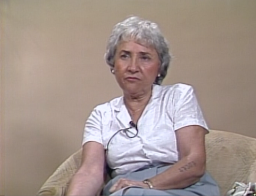
-
Hainewalde
ArticleThe SA established a protective custody camp at Hainewalde in March 1933. Well-known journalist and writer Axel Eggebrecht was among its early prisoners.
-
Testimony on the Escape from the Mir Ghetto by Eliezer Breslin
ArticleRead a summary extract from Eliezer Breslin’s testimony on escaping from the Mir ghetto, given during the WWII war crimes investigation into Semion Serafinowicz.
-
Auschwitz: Key Dates
ArticleExplore a timeline of key events in the history of the Auschwitz camp complex in German-occupied Poland.
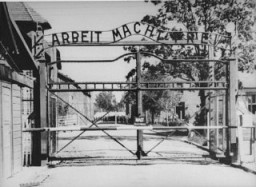
-
Theresienstadt: "Retirement Settlement" for German and Austrian Jews
ArticleIn 1942, German authorities began to deport German and Austrian Jews to Theresienstadt. Learn about the administration of the camp-ghetto and Jews’ experiences.
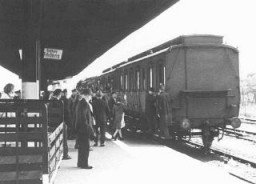
-
Tehran Children
ArticleLearn about the “Tehran Children,” a group of Polish-Jewish refugees. In 1942, they were resettled from the Soviet Union to Palestine via Iran.
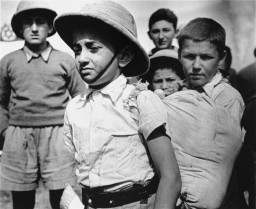
-
Supreme Court Decision on the Nuremberg Race Laws
ArticleLearn more about the 1936 German Supreme Court decision on the Nuremberg Race Laws.
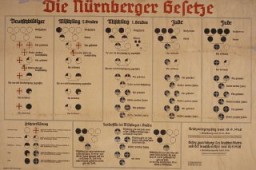
-
Jewish Aid and Rescue
ArticleJewish groups worldwide helped rescue thousands during the Holocaust. Read more about efforts to save Jews from Nazi persecution and death.
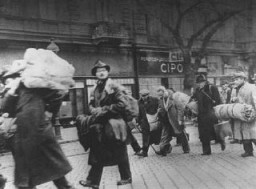
-
Sachsenhausen
ArticleIn July 1936, the SS opened the Sachsenhausen concentration camp as the principal concentration camp for the Berlin area.
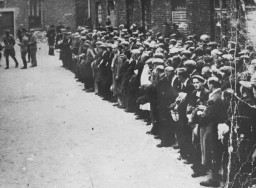
-
The Police in the Weimar Republic
ArticleThe Weimar Republic existed in Germany from 1918-1933. Learn more about German police during that time.
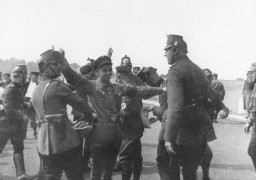
-
The Oneg Shabbat Archive
ArticleBegun as an individual chronicle by Emanuel Ringelblum in October 1939, the Oneg Shabbat underground archive became the secret archive of the Warsaw ghetto.
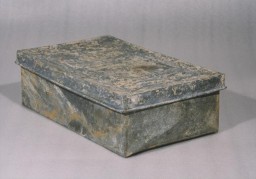
-
Children's Aid Society (Oeuvre de Secours aux Enfants)
ArticleDuring WWII, the Children’s Aid Society (OSE) operated 14 children's homes throughout France to save Jewish children from internment and deportation to killing centers.
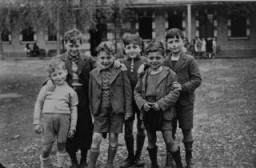
-
Warsaw Uprising
ArticleThe 1944 Warsaw uprising was the single largest military effort undertaken by resistance forces to oppose German occupation during World War II.
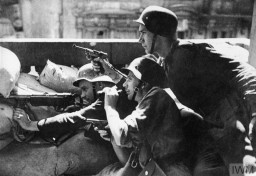
-
Gleichschaltung: Coordinating the Nazi State
ArticleGleichschaltung is the German term applied to the Nazification of all aspects of German society following the Nazi rise to power in 1933.
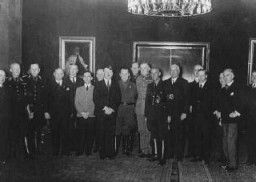
-
Communism
ArticleCommunist ideas spread rapidly in Europe during the 19th and 20th centuries, offering an alternative to both capitalism and far-right fascism and setting the stage for a political conflict with global repercussions.
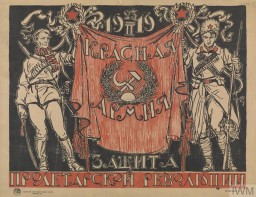
-
British Forces Approach Neuengamme
Timeline EventMay 4, 1945. On this date, the SS troops evacuated approximately 9,000 prisoners from Neuengamme in advance of the British troops' approach.
